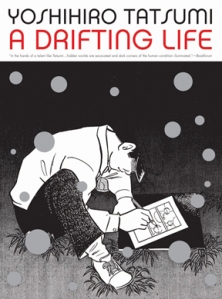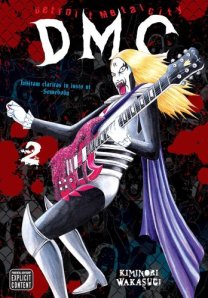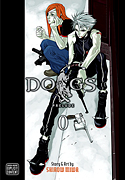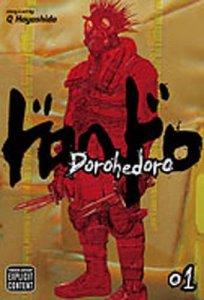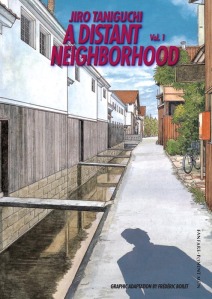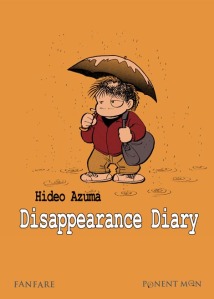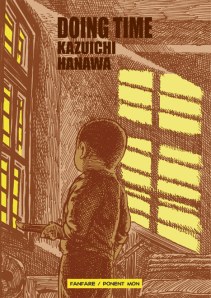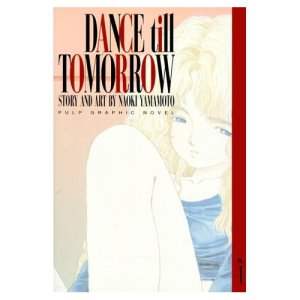I started this project a while ago, but then I took a break because the manga industry was irritating me. My equilibrium has largely been restored, so let’s resume! In just a minute! After I relate the essence of an interesting conversation I had with Erica (Okazu) Friedman about seinen. She had recently written a piece for The Manga Critic in which she expressed an enduring fondness for seinen, but she noted that the seinen we tend to see isn’t representative of the vast majority of the category, which is much more “Clive Cussler audience” in nature than the art manga we tend to see. I’m not saying I’m dying for Clive Cussler audience manga, but I thought that was worth noting, at least to drive me to confess that I’m not as interested in the macho stuff as I am the off-brand stuff. All that said, “D” is for…
North American publishers Dark Horse and Del Rey (I hate your new web site!) have both published a number of seinen manga titles. Dark Horse in particular is well known for its releases in this category. Before it shifted its priorities primarily to shônen-ai and yaoi, Digital Manga published some nifty seinen titles. DC published a number of excellent seinen series under its CMX imprint, but then they killed the line because they can’t make all the profit off of crappy movie adaptations of Emma starring Jennifer Aniston. Okay, we should all be thankful for that.
I’m never exactly sure where the demarcation point is between gekiga and seinen, though I would assume that gekiga can be viewed as a subset of seinen. Thus, a nod must go to Drawn & Quarterly for publishing a great deal of work by Yoshihiro Tatsumi, who helped create gekiga and whose autogiobraphy, A Drifting Life, recently won a few Eisner Awards.
On the licensed front, there are several Viz titles worth mentioning.
Detroit Metal City, written and illustrated by Kiminori Wakasugi and originally serialized in Hakusensha’s Young Animal, is a hilarious parody of death metal, its providers and adherents.
Shirow Miwa’s Dogs, originally serialized in Shueisha’s Ultra Jump, has some amazing art and takes an interesting approach to ultra-violence.
Q Hayashida’s Dorohedoro blends ultra-violence, comedy and the supernatural. It originally ran in Shogakukan’s Ikki magazine and is serialized on Viz’s SigIKKI site.
Fanfare/Ponent Mon has published Jiro Taniguchi’s A Distant Neighborhood about a man who gets the chance to relive his early teens. The comic was originally published in Shogakukan’s Big Comic.
They’ve also published Hideo Azuma’s autobiographical Disappearance Diary, originally published by East Press.
And there’s Doing Time, Kazuichi Hanawa’s autobiography of his stint in prison.
We came this close to not seeing all of it in print, but dedicated fan nagging resulted in Tokyopop releasing all of Minetaro Mochizuki’s amazing survival drama Dragon Head, which originally ran in Kodansha’s Young Magazine.
On the unlicensed front, I’d be remiss if I didn’t mention Drops of God, written by Tadashi Agi, illustrated by Shu Okimoto, serialized in Kodansha’s Weekly Morning, and profiled in roughly one million news articles.
Kio Shimoku, gifted creator of Genshiken, has a new series in Kodansha’s Afternoon called Digopuri, which is about a newborn and the frazzled adults around her.
Delcourt publishes some awesome manga in French, some of it seinen.
I’m never sure about the magazine Dengeki Daioh, published by Media Works. Most of the resources list it as shônen, but it’s widely described as basically being for perv-y grown men perhaps best represented by the male teacher in Azumanga Daioh, which ran in Dengeki Daioh. And here lie the perils of discussing categories! Does one go with the official publisher line? The on-the-ground reality? Or the general, filtering perception that reaches North American shores?
So, what starts with the letter “D” in your seinen alphabet?
Updated:
Commenter Jim mentioned Naoki Yamamoto’s Dance Till Tomorrow, a seven-volume series published by Viz and originally serialized in Shogakukan’s Weekly Big Comic Spirits. It was serialized in Viz’s Pulp up until its cancellation.
